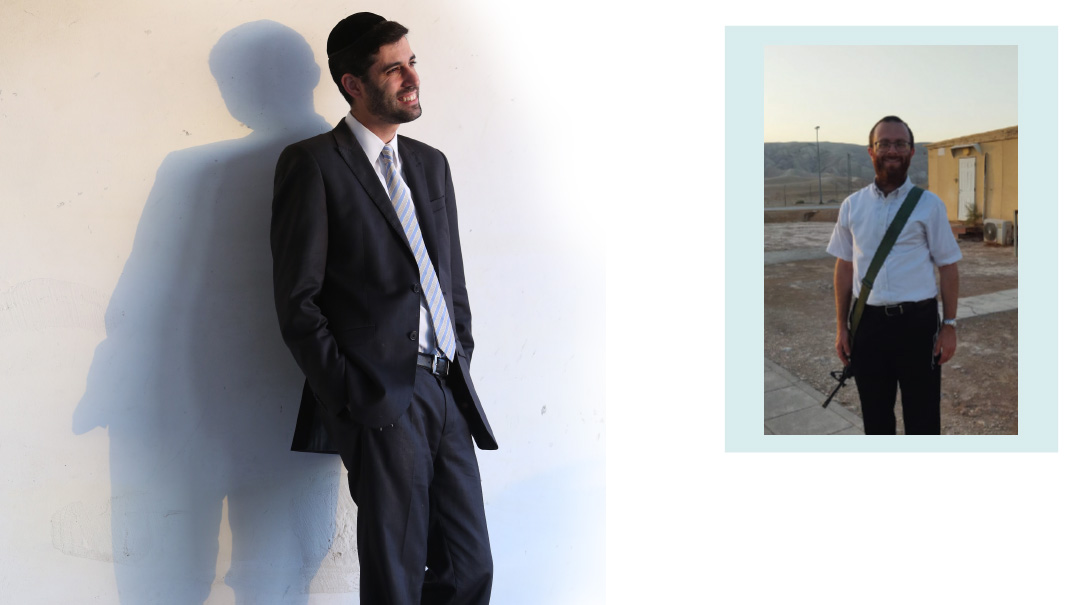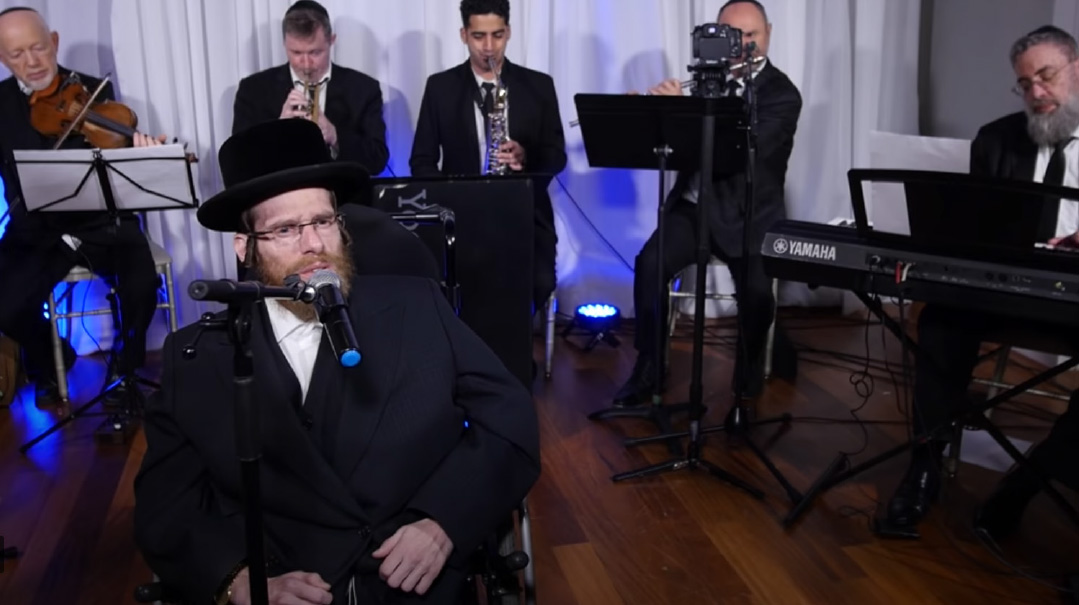Issue 1002
| March 5, 2024Part of that song, a chant of “B’EZRAT HASHEM NENATSEACH” is the opening and title of Ari Goldwag's just-released album

Front-line Fuel
IN the third week of Israel’s war in Gaza, ARI GOLDWAG received an email from a friend fighting in a tank battalion in Gaza. As a soldier in the thick of war, Elisha Loewenstern asked him to write a song to encourage the soldiers and strengthen their emunah. Elisha sent along with this request a quote from the writings of the Rambam, instructing a soldier who goes into war not to be afraid since he is fighting on behalf of Hashem. At the time, with a war raging in Gaza and so many Jewish lives lost, Ari didn’t feel up to composing music, but as he emerged from the paralysis of the aftermath of the Simchas Torah tragedy, he wrote a song for Elisha and sent it to him. Part of that song, a chant of “B’EZRAT HASHEM NENATSEACH” is the opening and title of Ari’s just released album.
It is still difficult to absorb that five weeks later, Elisha Loewenstern Hy”d fell in battle, leaving a wife and six young children. For Ari, who lives near Elisha’s parents in Beit Shemesh, the loss felt very close. “Elisha’s wife, Mrs. Hadas Loewenstern, asked me to come to the shivah, so of course I went. I didn’t want to publicly connect a song to their family’s personal tragedy without their permission, but when presented with the idea, Elisha’s wife felt that anything that could serve as an aliyah for his neshamah or publicize her husband’s name in the Jewish world was something that should be done.”
Ari chose not to place the whole track on the album, but the opening chant is included, introducing an upbeat song on the theme of the power of mitzvos, especially tefillin, to protect us and empower us. Zevi Kaufman, who sings the track with Ari, has been involved in raising millions to buy tefillin for Jewish soldiers who commit to wearing them. The body of the song “Vera’u kol amei haaretz… [and all the nations of the world will see that Hashem’s name is called on you and will fear you]” incorporates Chazal’s explanation that this fear is evoked by the tefillin worn on a Jew’s head. Catchy Hebrew and English lyrics (“No stronger weapon can you wield / I’ve got my spiritual shield…”) bring the message home.
Ari loves to introduce new singers as well as collaborate with old friends, among them, Yosef Karduner — who might probably be singing English vocals for the first time. A surprise “guest" is 13-year-old Ari himself, singing along in a duet. “Not bad for a 13-year-old,” Ari says about his former self in the song “Al Hatzaddikim” which he himself composed and recorded back in 1992. He’s developed that germ of a song, though, having deepened and strengthened it.
“My parents bought me a keyboard and a four-track recorder back then. I used one track for music, one for the melody, and two for harmonies. I wrote a song with the words of the brachah ‘Al Hatzaddikim,’ from Shemoneh Esreh, and recorded myself. Recently, sitting with my guitar in the hills around Beit Shemesh, I thought about that brachah. The truth is that while it starts with the tzaddikim and chassidim, it comes down to ‘vechol habotchim beshimcha be’emes — all those who truly believe in Your Name,’ and place our portion with theirs forever, because we trust in You.”
Ari composed a song about emunah and bitachon, and found that subconsciously, he had lined it up with the old melody he’d played on the keyboard as a kid. “The cool thing is that with today’s technology, I was able to slow down and enhance the old recording, so the voice from the past sounds even better than the original, and it is deepened by the adult understanding.”
“B’Yerushalayim” is another powerful and moving tr ack about the glorious future of Yerushalayim, and along with “Tomorrow is New,” “Close to You,” and “Live to Give,” the album offers content that is relatable, hopeful, and optimistic.
Nostalgia Never Gets Old
The selections on BARUCH LEVINE’s latest KUMZITZ ALIVE album are all his own compositions that span many years and many artists. While music consumers love fresh material, with one release after another debuting batches of new compositions that make waves across the Jewish music scene, the old classics are still — deservedly — sung, sung and re-sung. They are beloved and uplifting, and for many, they tap into a reservoir of strength and faith deep within.
The album, produced by Doni Gross, is released as a full-length audio production, as well as a video premiere of the kumzitz produced by Gavi Starke of Gavi Productions. Included in this playlist are some songs Baruch composed over two decades ago, long before he ever considered singing professionally, back when he wrote songs and offered them to other artists to perform. Favorites from this era — including “Chasoif,” sung by Yaakov Shwekey, “Ain Aroch” from Dovi Dovid, and “Lecha Dodi,” sung by Yisroel Werdyger — join the songs Baruch himself released, such as “V’hoo Keili” and “Bit’chu,” right up to more recent pieces like “Tov Li.”
One oldie, “Ain Hakodesh Baruch Hu,” which Baruch wrote for Yehuda! at the very beginning of his own musical journey when he was just 16, is especially prescient in these times. Its words from Mesillas Yesharim — “Ein Hakadosh Baruch Hu oheiv elah lemi she’oheiv es Yisrael, vekol mah shemagdil letovaso shel Yisrael, HaKadosh Baruch Hu magdil alav [The Holy One loves those who love Yisrael, and to the extent one increases the benefit for Yisrael, the Holy One will increase it for him]” — are remarkably apt for these days when the achdus of Klal Yisrael seems to have been supercharged.
In a fresh twist, the album is not studio recorded, but recorded from a live kumzitz held on the first night of Chanukah in Lakewood. The only advertising was by word of mouth, and Baruch was unsure if ten bochurim would arrive to sing, or a thousand. The turnout ended up larger than expected, but because the room was set up to record the crowd in a very delicate and deliberate way, there were only seats for the first hundred.
Whereas the music score was written up by Doni Gross in advance and the guitar tracks had been pre-recorded in studio, the singing was spontaneous, and its vibe captures that kumzitz feel, rather than the pristine perfection of a studio album. Mics were hooked up on the ceiling, capturing the crowd, and each medley was sung twice, giving everyone a chance to catch on completely to the songs. Baruch’s solo harmonies are striking against the melody sung by the bochurim. The “Vhaarev Na” songs are sung with energy and passion, while Baruch enjoyed the opportunity to sing his original “Vezakeini” together with his son (not to be confused with the newer “Vezakeini” he composed for Bonei Olam). “Eighteen years after the song was written, it was special to sing Vezakeini with my son, who had just been born then.” Another warm touch on a throwback music experience.
Songs to Sleep by
There’s a vintage lullaby in Yiddish from Chazan Yossele Rosenblatt that my father used to sing to me:
Ay li lu li lu, ay li lu li lu,
Ay li lu li, lu li, lu li, ay li lu li lu,
In rough translation of the Yiddish, it means “Sleep my little birdie / Sleep through the entire night / Over your head an angel guards / Close already your eyes Ay li lu li lu, ay li lu li lu,
Ay li lu li, lu li, lu li, ay li lu li lu,
I actually do find myself singing it to my little one every now and then. Sometimes I sing Abie Rotenberg’s "Neshomele" and other songs that come to mind on the spur of the moment.
—YoIly Polatsek
(Zemiros Choir)
(Originally featured in Mishpacha, Issue 1002)
Oops! We could not locate your form.







